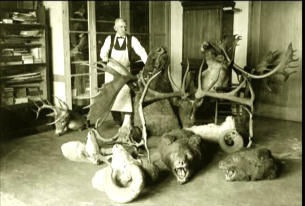

 The Accurate Reloading Forums
The Accurate Reloading Forums  THE ACCURATE RELOADING.COM FORUMS
THE ACCURATE RELOADING.COM FORUMS  Hunting
Hunting  Taxidermy
Taxidermy  Waaaay back when.....
Waaaay back when.....Go  | New  | Find  | Notify  | Tools  | Reply  |  |
| one of us |
About 100 years ago when I first came to Africa (well, 27 years ago actually) the guy who got me into African hunting wouldn't use salt on his skins...... instead, we'd skin the animals ourselves, wash them, drain them off and then he would produce a bottle of something and we just gave each skin a gentle wipe over every inch, we then left it in the shade for a few hours to dry and then folded them and put them away..... you could leave the skins for a number of YEARS and they would still tan perfectly...... He learnt this method in India when he was a kid. Years later, I found the recipe for this magic lotion of his and it had 2 types of arsenic (arsenate & arsenite if I remember correctly?)in it..... which must have been the reason we had to be so careful about washing our hands afterwards....... Bloody dangerous really! I just wondered if anyone else out ther ever heard of this or ever used it? | ||
|
One of Us |
Yes. For some reason bacteria does not like arsenic.LOL Dry skin is still used by many and especially trappers who trap fur for international sales. Bacteria trive on H2O. Dehydrating skins halts some bacteria. Also, in some humid low land countries such a Holland, salt is not used very much on skins. I never used arsenic. exit31 Why shall there not be patient confidence in the ultimate justice of the people? Is there any better or equal hope in the world? Abraham Lincoln | |||
|
| One of Us |
I have a really old book that discusses some taxidermy. It used to be common to use "arsenic soap " to preserve the skins before mounting. the chef | |||
|
| One of Us |
i used to have a taxidermist that did an arsenic treatment on birds to tann them before he mounted them. | |||
|
| One of Us |
Arsenic soap was used to keep insects out. I don't know why your friend wouldn't have used borax and water for what he intended its use. Borax keeps insects out just as well, but isn't as deadly. The hide prep you refer to is still used extensively in Africa. It's called air drying or "flint drying". Hides that are flint hard, like dry salted hides will last forever, but flint hides rehydrate very quickly when exposed to water, unlike the salted ones. It also keeps the hides from stretching as easily in the long term. RETIRED Taxidermist | |||
|
| One of Us |
I have an old book from the Peter Capstick library by Kalman Kitteridge(sic) where they talk about using arsenic to preserve the skins and the effect it has on fingers and finger nails. Pro Staff for: In Natures Image Taxidermy | |||
|
| One of Us |
When I first started doing taxidermy about 36 years the only thing we had back then was arsenic. I hated useing it and after reading books by Leon Pray ,and a couple of other, older than me taxidermist I started useing borax, it worked as well and I felt safer. Rich Wildlife Taxidermy by Richard G. Santomauro 1732 Hgy #71 Wall NJ 07719 phone 732-449-5950 http://www.rgswildlifetaxidermy.com | |||
|
| One of Us |
Richard, not picking a fight, but I've been a taxidermist for 48 years. Your post on arsenic being used doesn't match my experience. J.W. Ellwood offered a "magic tanning powder" called Calorax (It was probably a play with words and letters from talc and borax). By 1970 (36 years ago), most people were injecting birds with Balmex (A WWI embalming fluid) and tanning with Lutan, Luftan F. Most people I knew were simply doing what we call "pickling" or "pickle tanning" hides where they were soaked in an acid solution for several days, neutralized, and then mounted. Most of the arsenic era was gone by 1968 or so because the dangers were becoming too obvious. RETIRED Taxidermist | |||
|
| One of Us |
George, when I started doing taxidermy I joined a couple of established taxidermist in my area and that was the only thing they used. I didn't have access to any thing else at the time. The chemicals you spoke of, I used a year or two later when I went out on my own. The shop we worked out of was still using a 2x4 with the deer skull on the end and packing it with straw. One of the guys found a laminated paper form and that was the greatest thing since sliced bread. I know you have been doing it longer then me and I admire your longevity. No offense taken. Rich Wildlife Taxidermy by Richard G. Santomauro 1732 Hgy #71 Wall NJ 07719 phone 732-449-5950 http://www.rgswildlifetaxidermy.com | |||
|
| Powered by Social Strata |
| Please Wait. Your request is being processed... |
|
 The Accurate Reloading Forums
The Accurate Reloading Forums  THE ACCURATE RELOADING.COM FORUMS
THE ACCURATE RELOADING.COM FORUMS  Hunting
Hunting  Taxidermy
Taxidermy  Waaaay back when.....
Waaaay back when.....

Visit our on-line store for AR Memorabilia

